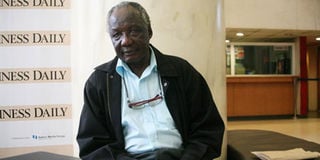A salute to philosopher and wordsmith Philip Ochieng

The late Philip Ochieng.
What you need to know:
- Philip Ochieng was always an outsider of sorts in that he never fitted easily into the pigeonholes of Kenyan intelligentsia.
- His unforgiving pen wrote direct and declarative pieces; in matchless compactness, thrift and exactitude.
In mid-August 1776, crowds formed outside the home of David Hume, the respected Scottish philosopher. Since Hume was an ardent atheist, the crowds were anxious to know how he was facing up to his imminent demise as one who didn’t believe in the afterlife.
The Scottish biographer, James Boswell, visited Hume on his deathbed as Boswell “had a strong curiosity to be satisfied if he persisted in disbelieving a future state even when he had death before his eyes”.
I thought of this story when I learnt on April 27, 2021 that Philip Ochieng, Kenya’s foremost newspaper columnist and avowed atheist, had passed on. On religion, he once wrote: “When leaving my South Nyanza to attend high school in Kikuyuland, I was already forming my own ideas concerning religion. Yet the intensely religious climate of Alliance simply added speed to my departure from religion. Nevertheless, social goodness is what I still advocate”.
What did he think about himself at the end of his life? What did he think about the scruffy kid from Awendo whose journey from innocence to experience took him to the hallowed halls of Alliance High School and later to become the revered writer, ferocious thinker and uncontested grammarian?
Ochieng was a non-conformist and contrarian thinker; a provocative polymath. He was always an outsider of sorts in that he never fitted easily into the pigeonholes of Kenyan intelligentsia, though there was no doubt about his intellectual force, rigour and fluidity. He also had the Shakespearean duplicity of being intellectually aloof to be able to maintain enough distance with the society he critiqued, but he was intimately close enough to know what people were going through and what they said in various settings.
Unforgiving pen
His unforgiving pen wrote direct and declarative pieces; in matchless compactness, thrift and exactitude. His column jarred in a defiant style that was part treatise and part Olympian disdain for those who transgressed grammar rules. He went for such linguistic transgressors with the zeal of a rugged ragamuffin; in no-holds-barred brawls.
He had no qualms openly chastising us and was never afraid of provoking audiences. “No, you ‘can’t be able’ to do anything,” Ochieng once wrote in exasperation; reminding us that, “nobody seems to know that the auxiliary verb ‘can’ and the verbal phrase ‘be able’ mean exactly the same thing.”
In a 29 November, 2019 article entitled, “There is no such thing as ‘my names’,” Ochieng delivered another national rebuke, as always, delivered in absolute certitude. He wrote, “I was called Ochieng because I was born ‘under the sun’, that is, around noon (from the Luo word chieng, “the sun”). Only at baptism did my mother choose Pilipo for me (“Philip”) …I reiterate that my name is Philip Ochieng. During the Kriegler inquiry, people constantly introduced themselves something like: ‘My names are Robert Ali Matatu, Wafula Kimani, Nyamweya arap Fulani.’ I continue to hear this nonsense from especially our television screens.”
As he corrected us, he delved into wide historical sweeps, science and philosophy. He dug into the poetics of the complexity of language; explaining not only the literal use of words but also their metaphorical, narrative, logical and aesthetic sides. He was, therefore, more than a grammar police; he was an uncompromising political, cultural and social critic. He had philosophical depth and leaping eclecticism — probing not only into the origins of English words with a smattering of Latin or other languages but also explaining the roots of Greco-Latin words and the superstructure of English and detailing the historical origins of certain phrases.
Harshest comments
He reserved some of his harshest comments for the Kenyan media. “Our own journalists,” he once wrote bitterly, “are the ones who lead our young language learners astray through atrocious grammar.” And he bashed what he called the media’s propensity for “allusions, abbreviations and aphorisms… which you can understand only if you live in Kenya and only if you are a regular print media consumer”. He asked, for instance, “What on this earth is a ‘Lands CS’? What, in any case, is a ‘CS’?” Such reporting gave him no end of grief!
Ochieng also didn’t fudge harsh truths when it came to politics. Controversially, many didn’t reconcile his later articles as the voice of conscience under repression when he had earlier worked for Kanu’s Kenya Times and defended Kanu’s overbearing regime.
Edward Said once wrote about the contradictions of life, metaphorically comparing them to a book: “It is… unreconciled… in which the contradictions and antinomies of our lives and experiences remain as they are, assembled neither... into neat wholes nor into sentimental ruminations about the past.”
However, this Kenya Times stint controversy didn’t prevent Ochieng from criticising bad leadership. He once wrote: “Kanu’s accusers in and outside Parliament have proved equally tyrannical and ravenous. At least Kanu never pretends about it. It never makes any noise about good governance and accountability, that kind of hypocrisy”.
Philip Ochieng has gone to what he once described as the “destination from which, according to both Ecclesiastes and Mark Twain, ‘no traveller ever returns.’” However, we have hundreds of his articles to still glean from. We can start by not saying “my names are…” but instead always saying, “my name is…”





